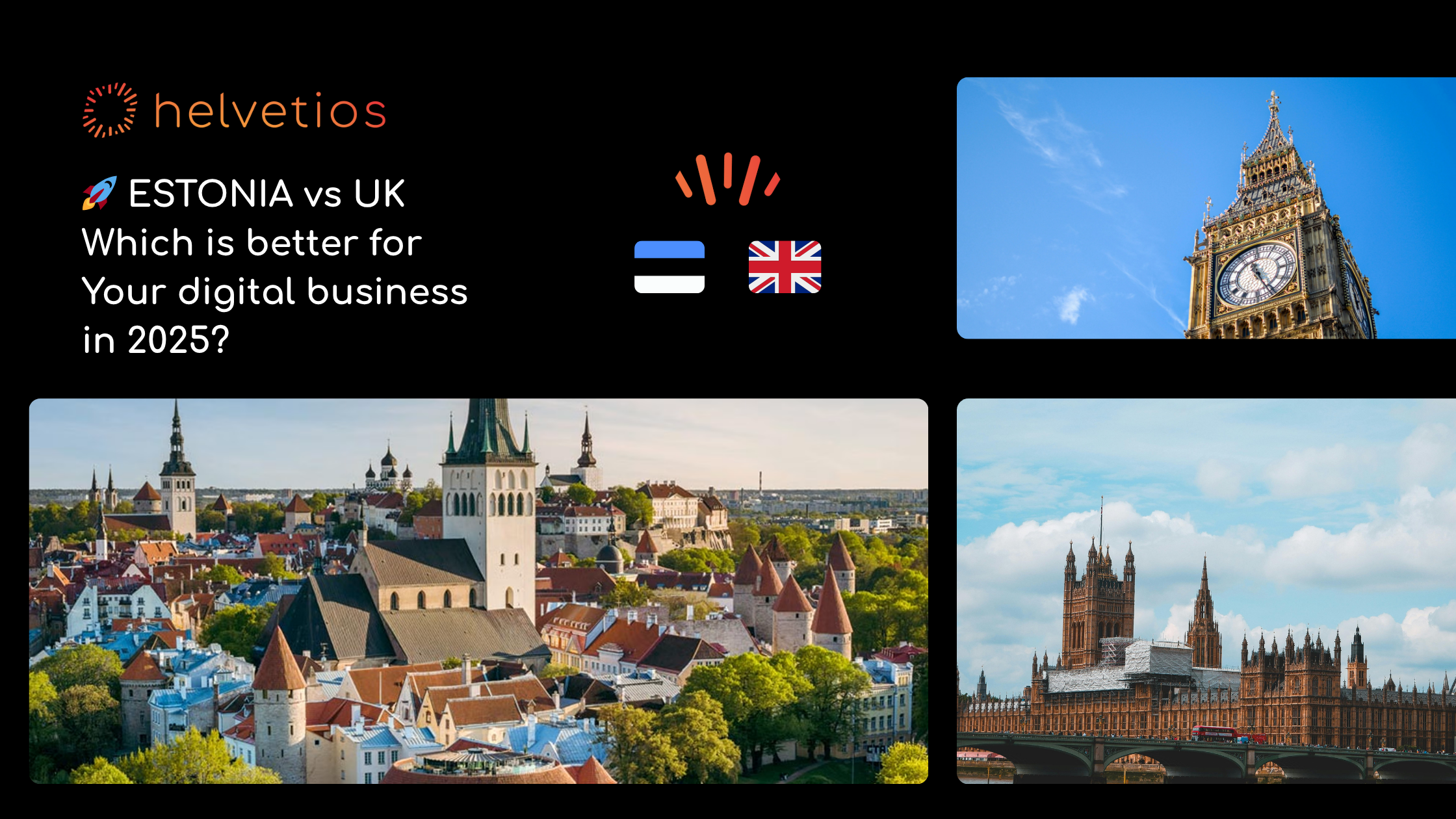Introduction: The Remote Entrepreneur’s Crossroads – Estonia or the UK?
The rise of digital businesses and the widespread adoption of remote work have fundamentally reshaped the landscape of international company formation. For entrepreneurs seeking efficiency, digital convenience, and strategic access to key markets, two nations have consistently emerged as frontrunners: Estonia and the United Kingdom (UK). Both offer compelling advantages for global-minded individuals and digital ventures.
Estonia, globally recognized as a leader in e-governance and digital innovation, boasts the world’s first e-Residency program and a vibrant startup ecosystem.
The UK, a perpetual top-tier global financial center and a powerhouse in technology and innovation, offers a highly reputable common law legal framework and extensive global connectivity.
Estonia, a pioneer in e-governance, champions digital residency and a unique tax system for reinvested profits.
The UK, a traditional global business powerhouse, boasts a flexible legal framework and a reputation for credibility. But which one is the right fit for your specific digital or remote venture in 2025?
As professional business analysts, we at Helvetios.eu understand this critical choice. This article provides a detailed, expert comparison to help you navigate the nuances of company registration, taxation, market access, and operational realities in Estonia and the UK, empowering you to make an informed strategic decision.
Executive Summary: Quick Compare – Estonia vs. UK
| Feature | Estonia | UK |
| Ease of Setup | Highly digital via e-Residency (1-5 days) | Very efficient, online via Companies House (1-3 days) |
| Primary Structures | OÜ (Limited Company) | Limited Company (Ltd) |
| Foreign Ownership | 100% permitted | 100% permitted |
| Corporate Tax | 0% on retained/reinvested profits (taxed only upon distribution at 22%) | Flat 19% (for smaller profits, rising to 25% for larger) |
| VAT | 24% | 20% |
| Residency/E-Residency | E-Residency (digital ID for non-residents) | No specific digital ID, no residency required for setup |
| Market Access | Full EU single market & Eurozone access | Global reach post-Brexit, outside EU single market |
| Key Appeal | Digital-first, unique tax on distributed profit, EU access, startup hub | Global reputation, flexible legal system, mature market, strong finance |
The Allure of Each Hub: Why Estonia? Why the UK?
Both Estonia and the UK have carved out distinct niches in the global business landscape, attracting entrepreneurs with their unique value propositions.
Why Estonia Continues to Attract Digital Pioneers:
- E-Residency: Estonia’s groundbreaking e-Residency program provides non-residents with a digital identity, enabling remote company formation, banking, and administration. This digital-first approach is unparalleled globally.
- 0% Corporate Income Tax on Reinvested Profits: This is arguably Estonia’s most attractive tax feature. Companies pay 0% corporate tax on retained and reinvested profits; tax is only applied (at 22%) when profits are distributed as dividends. This significantly boosts cash flow for growth-focused businesses.
- Highly Digitized Ecosystem: From government services to banking, Estonia boasts one of the most digitally advanced public administrations in the world, ensuring streamlined and efficient operations.
- EU Membership & Eurozone Access: As a full member of the European Union and the Eurozone, an Estonian company offers seamless access to the entire EU single market, making it an ideal base for European operations.
- Startup-Friendly Environment: Estonia has a vibrant and supportive startup ecosystem, attracting tech talent and venture capital.
Why the UK Remains a Global Business Powerhouse:
- Global Reputation & Credibility: The UK’s strong brand image, rich business history, and robust legal system (common law) provide immediate credibility and trust for businesses operating internationally.
- Flexible Legal System: The UK’s company law is renowned for its flexibility and ease of adaptation, catering to a wide range of business models.
- Access to Major Markets: While no longer part of the EU single market, the UK maintains extensive global trade relationships and remains a crucial hub for international commerce and investment, particularly appealing for businesses with non-EU global aspirations.
- Ease of Setup (Post-Brexit): Despite Brexit, the process for incorporating a company in the UK for non-residents remains straightforward and efficient through Companies House.
- Diverse Talent Pool: The UK boasts a large, highly skilled, and diverse workforce across various sectors, particularly in finance, technology, and creative industries.
Head-to-Head Comparison: Diving Deeper
Let’s break down the key factors to consider when deciding between Estonia and the UK.
1. Company Formation & Ease of Setup
- Estonia: The process is highly digital. With an Estonian e-Residency card, you can register an OÜ (Private Limited Company) entirely online via the e-Business Register, typically within 1-5 business days. No physical presence is required.
- UK: Company formation is also very efficient. You can register a Limited Company (Ltd) online via Companies House, often within 24-48 hours. No residency is required for directors or shareholders, making it highly accessible for non-residents.
2. Legal Structures & Ownership
- Estonia: The OÜ (Osaühing – Private Limited Company) is the standard and most recommended structure for foreign investors. It offers limited liability, separate legal personality, and allows for 100% foreign ownership. Minimum share capital is €2,500 (can be deferred).
- UK: The Limited Company (Ltd) is the most common structure. It also provides limited liability and allows for 100% foreign ownership, with no minimum share capital requirement (though typically at least £1 is issued).
3. Taxation
Estonia:
- Corporate Income Tax: Unique 0% corporate income tax on undistributed or reinvested profits. Tax (standard rate 22%) is only paid when profits are distributed as dividends. This makes it highly attractive for companies focusing on reinvestment and growth.
- Important 2025 Update: Estonia abolished its preferential 14% corporate tax rate for regular distributions from January 1, 2025, standardizing the dividend distribution tax at 22%. This change simplifies the tax structure while maintaining the core advantage of tax deferral on reinvested profits.
- VAT: Standard rate is 24% (effective July 1, 2025).
- Capital Gains/Dividends: Generally, no additional tax on dividends for recipients, provided corporate income tax has been paid at the company level upon distribution.
- Double Taxation Agreements: Extensive network of DTAs.
UK:
- Corporate Tax: Currently 19% for profits up to £50,000, rising progressively to 25% for profits over £250,000.
- VAT: Standard rate 20%.
- Capital Gains: Subject to Corporation Tax. Dividends paid by a UK company are generally not subject to further UK tax for non-resident shareholders.
- Double Taxation Agreements: Extensive network of DTAs.
4. E-Residency vs. Traditional Non-Resident Setup
- Estonia: E-Residency provides a secure digital identity, enabling remote authentication, digital signing of documents, and access to Estonian e-services. While not strictly mandatory for company formation, it streamlines operations significantly for non-residents.
- UK: The UK does not have an equivalent e-Residency program. Non-residents typically manage their companies through traditional methods (e.g., email, postal address, online platforms provided by formation agents) and do not receive a specific digital ID for governmental interactions.
5. Market Access & Connectivity
- Estonia: As a full member of the European Union and the Eurozone, an Estonian company offers seamless access to the entire EU single market (including free movement of goods, services, capital, and people) and uses the Euro currency. This is a major advantage for businesses targeting the European consumer base.
- UK: Post-Brexit, the UK is no longer part of the EU single market or customs union. This means trade with the EU involves customs procedures. However, the UK has strong global trade links and agreements, making it a powerful base for businesses with worldwide aspirations outside the EU.
6. Banking & Financial Infrastructure
- Estonia: Has a modern and digitally focused banking sector. While opening a corporate bank account for non-resident companies can sometimes be challenging without a strong physical link to Estonia, numerous fintech solutions (e.g., Wise, Revolut Business) and neo-banks often serve Estonian companies effectively.
- UK: Boasts a highly developed and reputable global banking hub with a wide array of international and local banks. While robust Know Your Customer (KYC) checks are always performed, opening an account for a UK company is generally more straightforward for non-residents compared to some other EU jurisdictions.
7. Operational & Compliance Considerations
- Estonia: Requires an annual report submission to the Commercial Register. Accounting must comply with Estonian standards. All companies must also submit a UBO (Ultimate Beneficial Owner) declaration.
- UK: Requires annual accounts and a confirmation statement to be filed with Companies House. Accounting standards are well-defined. Companies must maintain a Person with Significant Control (PSC) register, akin to UBO.
Who Should Choose Which? Tailoring Your Decision
The “best” jurisdiction ultimately depends on your specific business model, target markets, and long-term goals.
Choose Estonia if:
- Your business is primarily digital, remote, or e-commerce, and you operate with minimal physical presence.
- You are looking to reinvest profits for growth and benefit from the 0% corporate tax on undistributed earnings.
- You require full, unhindered access to the EU single market and prefer to operate within the Eurozone.
- You value digital-first administration and want to manage your company remotely with maximum efficiency.
- You are a solo entrepreneur or small startup seeking a modern, agile framework.
Choose the UK if:
- You seek global credibility and recognition from a widely respected business jurisdiction.
- Your primary market is the UK itself, or you require extensive global trade links beyond the EU.
- You prefer a common law legal system that is familiar and trusted by many international investors.
- You anticipate significant profit distribution and prefer a predictable, flat corporate tax rate on all profits.
- You value the access to a large, diverse talent pool within the UK or require access to sophisticated financial services.
Conclusion: Your Strategic Partner for Remote Business
Both Estonia and the UK offer compelling environments for digital and remote businesses in 2025.
Estonia stands out for its innovative e-Residency and unique tax deferral system, making it a haven for growth-oriented startups targeting the EU.
The UK, on the other hand, provides unmatched global credibility, a robust legal system, and excellent access to worldwide markets.
The decision is not about choosing a “superior” jurisdiction, but about identifying the one that best aligns with your strategic objectives. Navigating the intricacies of company formation, tax implications, and ongoing compliance in either country requires specialized expertise.
That’s where Helvetios.eu comes in. As your dedicated partner, we provide expert guidance, streamline the incorporation process, and ensure your business is set up for success, whether you choose the digital frontier of Estonia or the global powerhouse of the UK.









